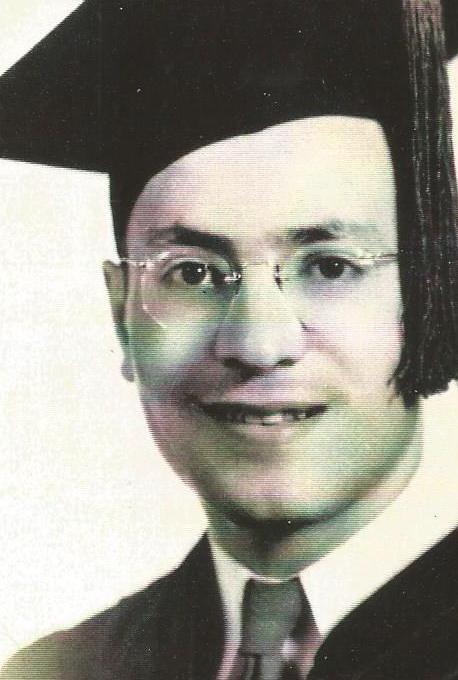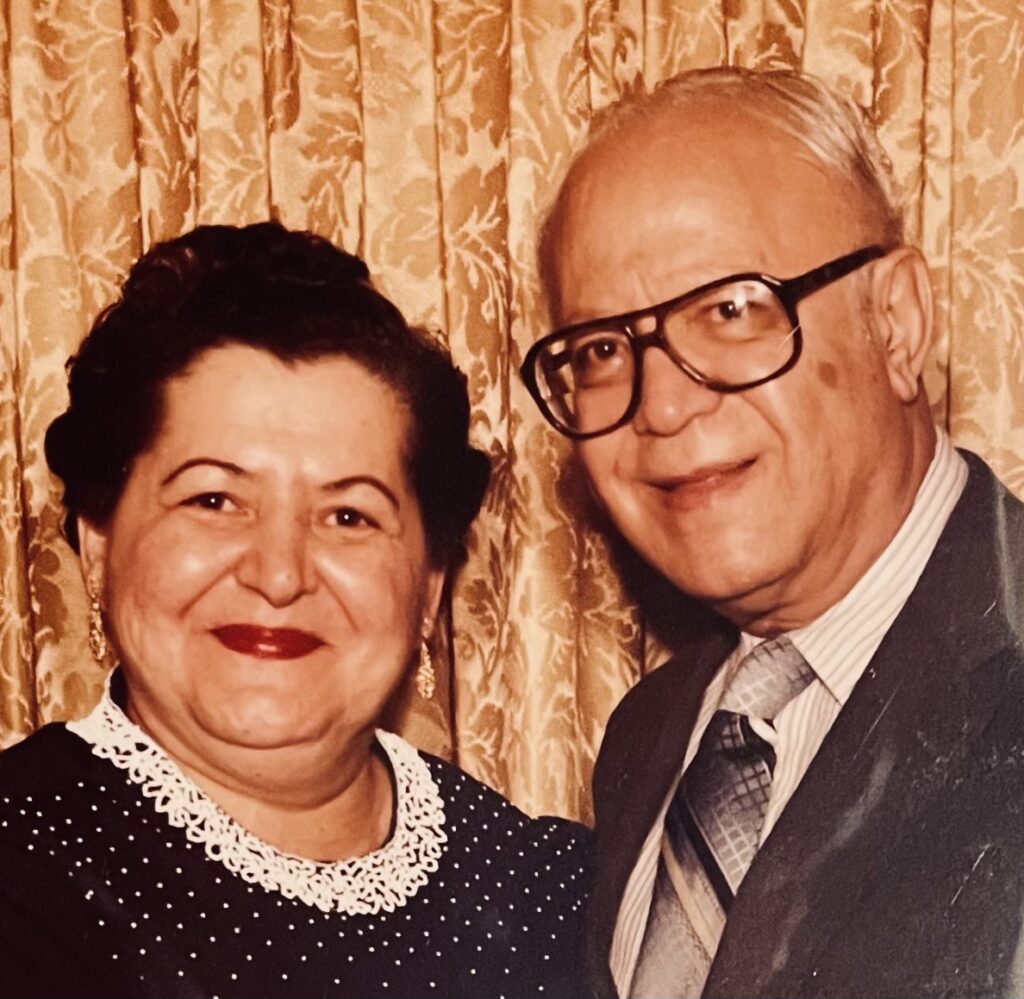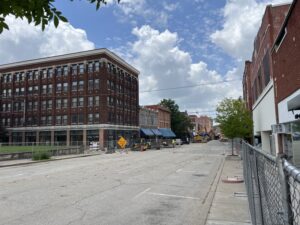Dr. Phillip Joseph was loved and respected by his patients and peers and left an indelible mark on this community.

He was born in Scranton, Pennsylvania, on November 26, 1913, to parents who had emigrated from Lebanon to the U.S. The family had relatives in the Sapulpa area and decided to relocate to Drumright, Oklahoma when Joseph was five years old. He attended Bristow Public Schools and High School. He then attended the University of Oklahoma and received his M.D. degree from the University of Oklahoma College of Medicine. After medical school, Dr. Joseph interned at Queen of Angels Hospital in Los Angeles, California.
Upon completion of his internship, he returned to Oklahoma to work for the Oklahoma Department of Public Health in Madill. At the time, one of his principal responsibilities and challenges was to implement chlorination in water for sanitation, to reduce the harmful effects of parasites, bacteria, and parasites, and to provide protection against waterborne disease outbreaks.
A number of local citizens raised strong objections which required Dr. Joseph to conduct public education sessions in the community. His outreach program proved to be successful and assisted in establishing trust among local residents. He subsequently moved to Sapulpa where he became director of the Creek County Health Department.
In 1949, while on a visit to family members in Lebanon, Dr. Joseph met his soon-to-be wife, Salwa Moubarak, the daughter of a prominent Beirut family. Two months later Phillip and Salwa were married.

However, the U.S. Consulate in Beirut threw a monkey wrench into Joseph’s plan to bring his new bride home to America. He contacted a family friend, U.S. Senator Robert S. Kerr, who was a rather influential figure in Washington D.C. in those days. The consulate was contacted by the State Department and miraculously reversed its decision.
Joseph established a private practice in 1943, thus beginning a lifelong career delivering over 4,000 babies, performing surgical procedures, and treating countless children and adults. He worked tirelessly with genuine altruism as his motive with a dedicated medical purpose of caring and improving the lives of his patients, not monetary remuneration.
He traveled throughout Creek County to make house calls to sick patients. For a number of reasons, many doctors across the country had discontinued the practice of making house calls. Dr. Joseph recognized the special needs of families–particularly those with small children, the elderly, and those without means of transportation in rural areas.
He continued the practice of making house calls, and many other physicians in the Tulsa Metropolitan area frequently referred their patients to Dr. Joesph for patient home visits and in-home care.
Because many of those patients lived in areas with limited access to medical care and maintained households in high-poverty areas, they were frequently unable to pay for their care. They made their payments with eggs, crops, hand-made crafts, or cooked meals, which Dr. Joseph gladly accepted.
Joseph would work up to seventeen hours a day and reportedly saw as many as fifty patients per day. “The phone would ring all night long. Dad would go to bed after we did and I would wake up in the morning, he was gone,” said oldest son Doug Joseph.
As a family physician and surgeon, he was truly multitalented. He did it all: he delivered babies, administered anesthetic, performed a wide range of medical procedures and treatments, took care of fractures, burns, sports injuries resulting from accidents, administered vaccinations, and treated numerous ailments—in other words, he treated any disease that might afflict a person and did so with humor and compassion.
Dr. Joseph diligently kept up with the latest medical procedures and pharmaceutical products. He spent nearly all of his spare time reading everything he could get his hands on to make sure he was able to provide his patients with the most recent life-saving treatments.
People would knock on the door of the Joseph home after hours seeking treatment for children, elderly parents, and other family members. Dr. Joseph cared for them, willingly, lovingly, and without complaint. He provided care to patients without regard to race, color, religion, or other attributes before the distinctions became the law—and always without regard to the source of payment or ability to pay.
He would often usher patients discreetly out the back door of his clinic after treatment because he knew they could not pay and he wished to spare them embarrassment. He would freely give out samples so people would not have to spend money on prescriptions. More often than not, he would call in a prescription to a pharmacy and tell the pharmacist to bill him instead.
One of his patients was a diminutive African American woman who arrived in Sapulpa from Muskogee at a time when she was in her final days of pregnancy. She went into labor, and being indigent, was unable to deliver her baby. She was referred to Dr. Joseph, who accepted her as a patient.
Because her labor was progressing, he bought her a bus ticket and traveled with her to Oklahoma City where he delivered her baby at University Hospital at no charge. The trio spent the night at the hospital and returned home to Sapulpa the next day.
This brief story was told by Tom Colbert during his induction ceremony as Chief Justice of the Oklahoma Supreme Court as he revealed that he was the baby that had been delivered by Dr. Joseph.
While Joseph was on his internship at the City of Angels Hospital in Los Angeles, he delivered the first daughter of Ronald Reagan and his first wife Jane Wyman. It was a strange enough story to tell when Reagan was a Hollywood actor. It became even more unusual once he became President!
Philip and Salwa Joseph raised five children in Sapulpa in a loving Christian home. Many of my friends and classmates remember playing with the Joseph children and eating meals with them at their residence. The Josephs were devoutly Catholic and were active members of the Sacred Heart parish.
Dr. Joseph retired in 1989 and passed away on December 20, 1991. In 2002, his wife Salwa wrote a glowing tribute to her late husband and sent it to the Sapulpa Historical Society.
Here are some excerpts from that letter:
“He was a good doctor, a dedicated doctor. He worked days and evenings and nights. He worked even when he was sick. People came to see him at the hospital when once he had surgery himself.
While I was there he wrote a prescription for a guest who came to see him; Phillip called in the drug store to send medicine for the sick, while he was sick himself. When that doctor of mine went to the emergency room to take care of one patient, he would see five, six, or seven at the same time, who would come knowing he was there. They came because they liked him and trusted him.
At his office, even after office hours, sick patients used to come for help. He never locked the door and said, ‘closed for the day.’ He always took care of these people after a hard day’s work; he was tired but he never complained. He was exhausted but never refused to see a sick person at the end of an exhausting day.
That Philip, my husband, had compassion for humanity. He didn’t take care of the helpless to get only their money, but he did help his fellow man. He took care of the young, the old, the black, the white, the rich, the poor, the clean, and the dirty.
He was an unusual man, a happy man, and a smiling man. The Lord blessed him with a beautiful family that loved him. This dad never denied one thing to his children. He was there many times, taking them to school on the way to work.
And when I was sick, he was the father and mother, helping his children with homework, or putting them to bed, or buying them toys from a catalog at night when he had a little free time. He loved his family more than any man did, in my opinion.
What do you call that person? Neither a preacher nor a priest. Not a saint on Earth had done what Philip did in his life. What does that doctor deserve? He deserves a special place in Heaven with his ancestors and his loved ones. As Senator Ted Fisher once said ‘God gave us his son on Christmas, and took away from his family and town of Sapulpa, a great man called Philip Joseph.”
Salwa died on April 5, 2006, and the Sapulpa Daily Herald subsequently did a story about the Josephs, interviewing a family friend, Jeanie Fitzsimmons, and his oldest son, Doug Joseph.
“Phillip and Salwa Joseph passed those values—respect, love, and dedication, to their children, not through lectures, but through their everyday lives,” said Fitzsimmons.
She went on to say: “Dr. Joseph’s office was always crammed with people from all across the area. People would spill into the hallways. They would wait for hours. They would have waited for Dr. Joseph forever.”
Doug Joseph said, “They gave us guidance, but mostly [they taught us] by example.”
Sapulpa Times recently interviewed Doug. He said that earlier in his life his dad was struggling with chemistry and asked for divine help. “He took a vow to God, to Christ…he vowed to Christ if God would help him learn chemistry, and become a doctor, he would never, never, turn anyone away, and he never, never, did.”
He recalled an incident in the last days of his father’s battle with diabetes. One day, after Philip Joseph had completed an exhaustive dialysis session, the phone rang and Doug answered. It was the receptionist at Pleasant Manor Nursing home. A resident who had been a nurse at Bartlett Hospital for nearly fifty years was suffering from a terminal illness. The former nurse requested that Dr. Joseph see her. “I mentioned this to dad. As sick as he was, as weak and sick as he was, he said, ‘let’s go now.’ He always put his pain aside, never talked about it, and took care of people, the purpose of their request.”
Doug took his father down to the nursing home and even though he was weak and nearly blind, Dr. Jospeh greeted everyone in the hall, then examined the resident, held her hand, and went up to the nurse in charge and gave instructions for his patient’s care.
Doug spoke about the suffering his dad endured in his last days, “It’s a sad sad thing to see someone so valuable to humanity still has to suffer, but then you think how Christ suffered, what he gave to humanity, and what he told us and told us, and that exactly was what in my dad’s heart. Always, not once in a while, he lived it, this was his heart.”
Dr. Phillip Joseph was that rare breed of physician who emulated Christ and truly loved his fellow man. He is gone but will never be forgotten.










